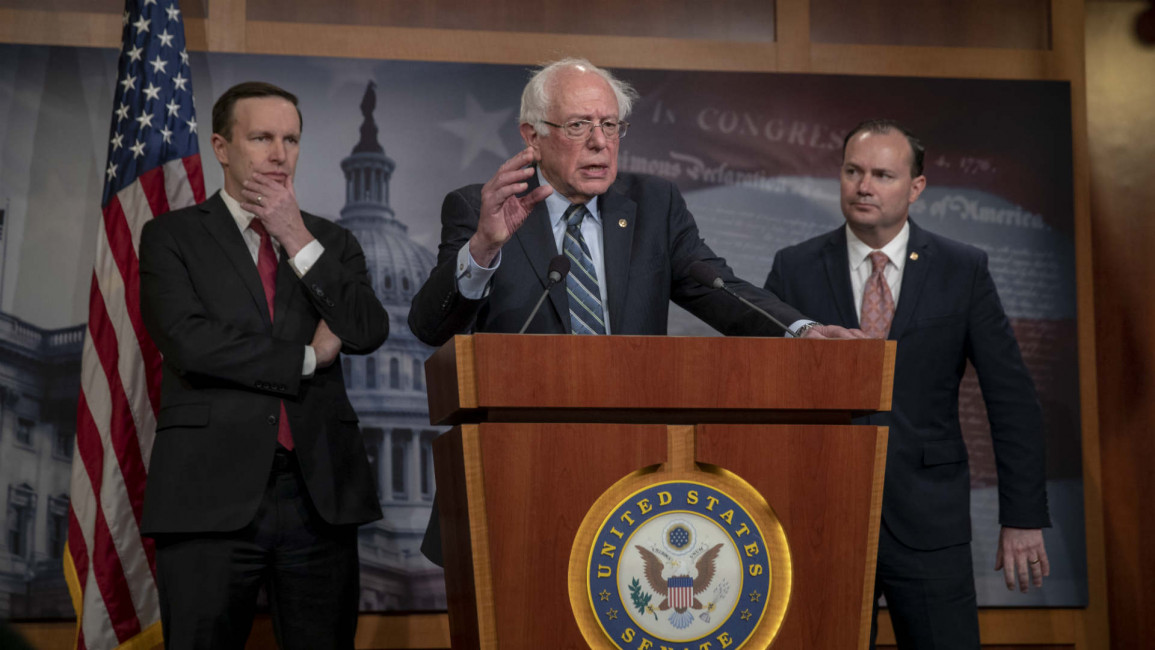Bernie Sanders confident Senate resolution to end US support for Saudi Arabia will win
“I think we’re going to win,” Bernie Sanders told US political outlet The Hill on Tuesday, in reference to a measure to curtail US support for the Saudi intervention in Yemen, to be voted on by the Senate in the coming weeks.
Sanders told The Hill he expects to force a vote on the resolution later this month or in early March.
According to the report, a simple majority of lawmakers, including Republicans, are expected to vote in favour of the resolution, after it was passed by the Democratic-controlled House, reversing course from late last year when the then Republican-controlled House blocked the bill.
Asserting congressional authority over war-making powers, the US House of Representatives approved the resolution last week. It could force the Trump administration to withdraw US troops from involvement in Yemen, in a rebuke of Donald Trump’s alliance with the Saudi-led coalition behind the military intervention.
Lawmakers in both parties are increasingly uneasy over the humanitarian crisis in Yemen and are skeptical of the US partnership with that coalition, especially in light of Saudi Arabia’s role in the killing of Jamal Khashoggi, a critic of the royal family.
|
Passage of the measure would mark the first time Congress has relied on the decades-old War Powers Resolution to halt military intervention. It also would set up a potential confrontation with the White House, which has threatened a veto. The House had voted 248-177 to approve the measure, sending it to the Senate, where a similar resolution passed last year.
If as Sanders predicted Senate approves the resolution, this would set up a showdown with the administration – a veto would be Trump’s first – over the president’s shifting approach on foreign policy.
Trump has yet to veto any measures from Congress. If he did veto the Yemen resolution, it is unclear whether lawmakers would have enough support to override him.
Lawmakers are quick to point out that Trump wants to withdraw troops from the wars in Syria and Afghanistan as part of his “America first” approach, but he has shown less interest in limiting the US role in Yemen.
The White House says the House resolution is “flawed” because US troops are not directly involved in military action in Yemen, where the coalition is fighting the Iranian-backed Houthi rebels in a conflict largely seen as a proxy war involving the Middle East’s dominant regional players.
Since 2015, the administration says, the US has provided support to the coalition, including intelligence and, until recently, aerial refueling, but it has not had forces involved in “hostilities”.
Congress has not invoked the War Powers Resolution, which requires approval of military actions, since it was enacted in 1973. Lawmakers approved more sweeping authorisations for the wars in Iraq and Afghanistan that some argue are being used too broadly for other military actions.
Newly emboldened Democrats in the House, eager to confront Trump on foreign policy, and Republicans in both chambers have shown a willingness to put a legislative check on the president’s agenda.
In the House, 18 Republicans, including members of the GOP’s libertarian-leaning wing and Trump allies in the conservative Freedom Caucus, joined Democrats in passing the Yemen measure.
Representative Ro Khanna, a California Democrat, who drafted the legislation, said there was an emerging bipartisan alliance that was skeptical of military intervention without congressional oversight.
“It’s not just about Yemen. It’s about the Congress taking a stand and every future president having to think twice about whether to authorize a military intervention without congressional approval,” Khanna said in an interview.
The Senate version is backed by independent senator Bernie Sanders of Vermont as well as the Utah Republican Mike Lee.
On Tuesday, Sanders announced in a televised interview his intention to run in the 2020 presidential election against Donald Trump, possibly adding further weight to his criticism for Saudi Arabia and the Yemen war.



